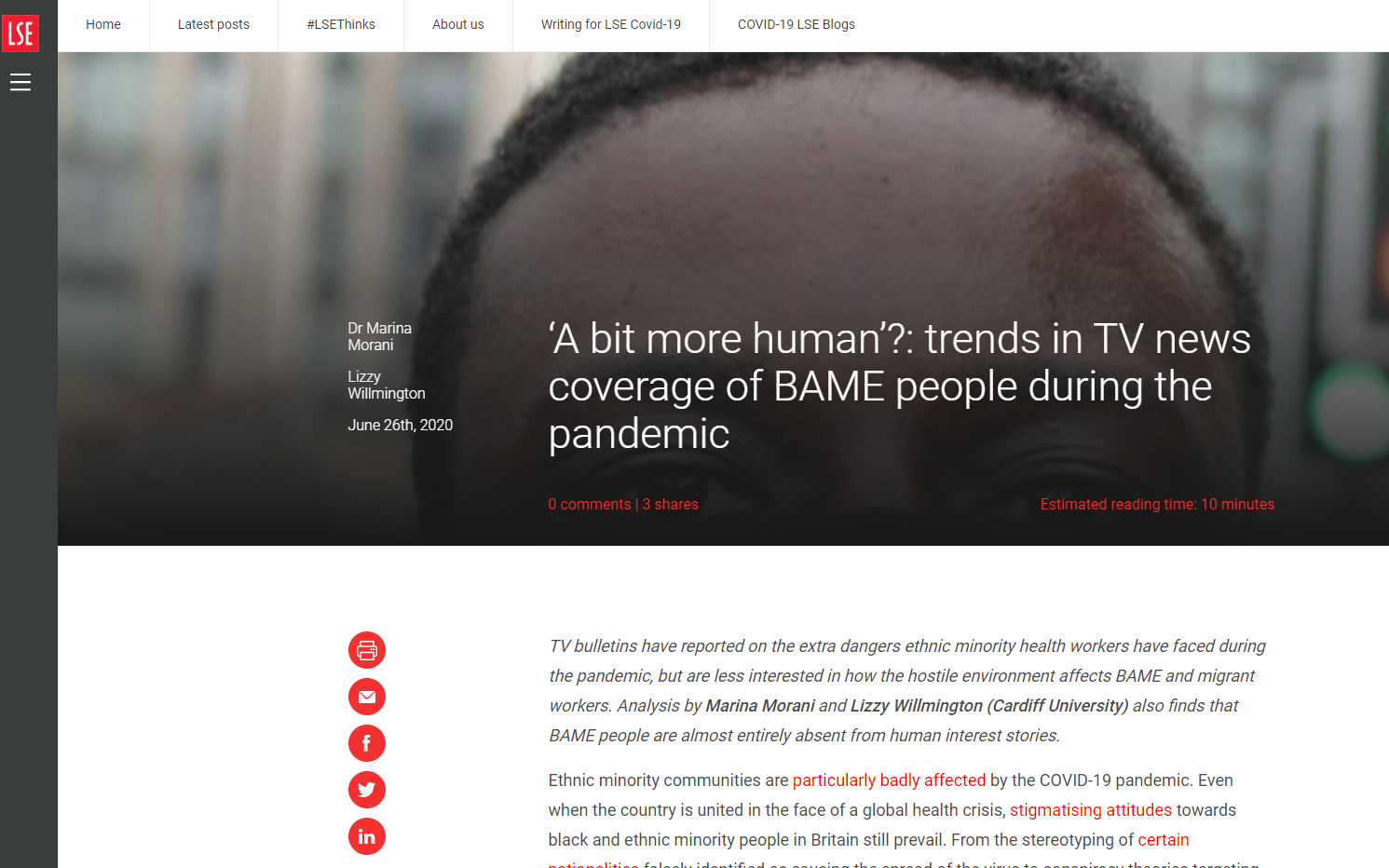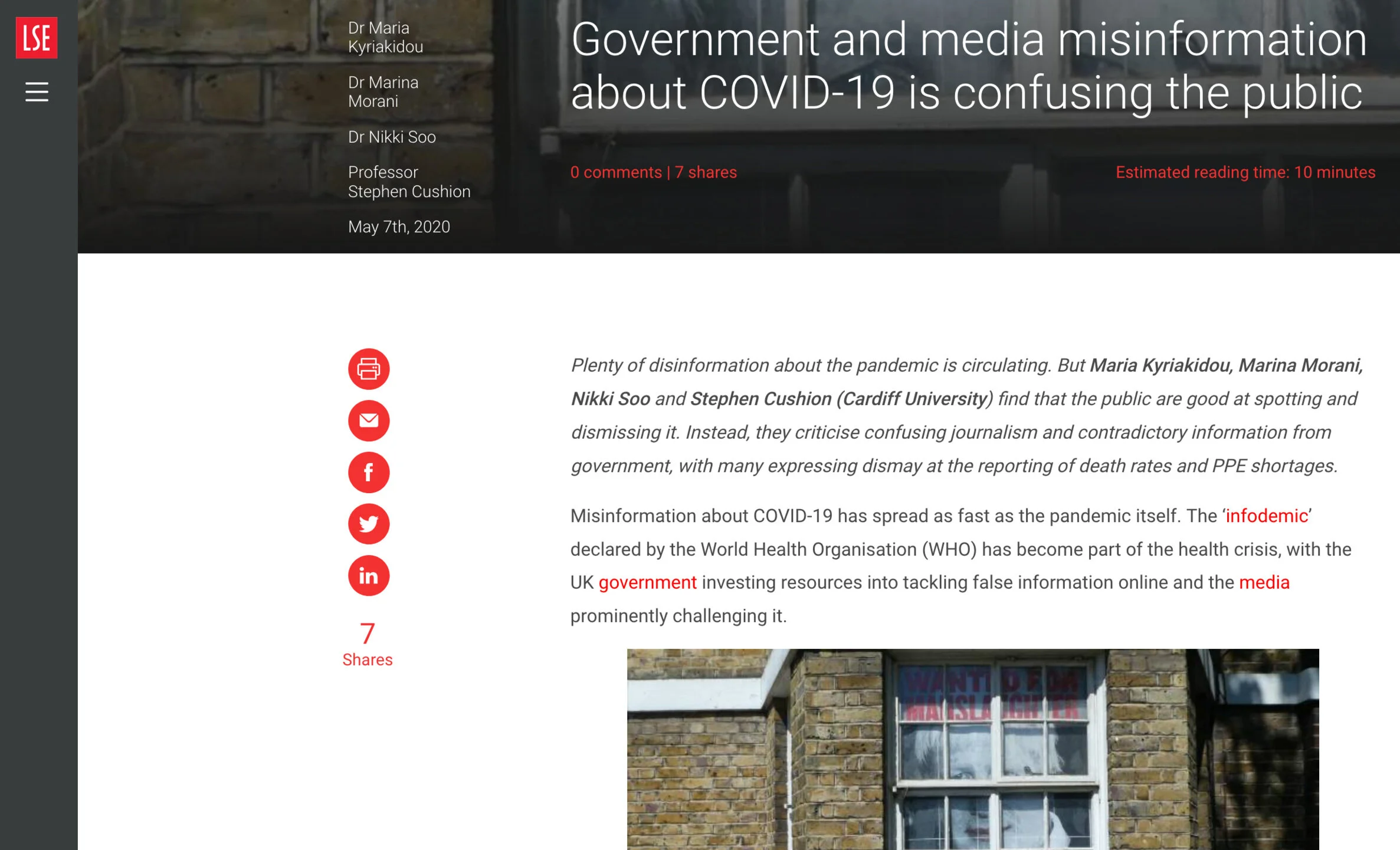Latest research
Our latest piece of research has recently been published in Journalism Studies; “Does the political context shape how “due impartiality” is interpreted? An analysis of BBC reporting of the 2019 UK and 2020 US election campaigns.” The research shows inconsistencies with how impartiality seems to be employed within the BBC, and in many instances a continued reliance on balance and “he-said-she-said” reporting, rather than true impartiality.
You can read the full paper here. To watch an animation highlighting some of the main findings of the paper, click on the video to the right. We worked with Learning on Screen to produce the video.

BBC: why enhancing the public broadcaster’s fact-checking would strengthen its impartiality
From the 1926 General Strike, through the 1956 Suez Canal crisis, to the more recent Brexit debate and the COVID-19 pandemic, how the BBC tries to ensure impartiality in its journalism has always generated fierce debates about its independence. Every director-general since its foundation nearly 100 years ago has had to contend with criticism of perceived BBC bias during high-profile political events and issues.
These days, the BBC also has to navigate new “culture wars” over questions of cultural sensitivity, free speech and censorship. No surprise, then, that the current director-general, Tim Davie, believes impartiality is central to the BBC’s long-term survival. To that end he has announced new plans to strengthen the corporation’s political independence by, for example, enhancing its use of fact-checking and appointing new external impartiality investigators to monitor all BBC content.

‘A bit more human’?: trends in TV news coverage of BAME people during the pandemic
TV bulletins have reported on the extra dangers ethnic minority health workers have faced during the pandemic, but are less interested in how the hostile environment affects BAME and migrant workers. Analysis by Marina Morani and Lizzy Willmington (Cardiff University) also finds that BAME people are almost entirely absent from human interest stories.

We spent six weeks asking people about media coverage of the Coronavirus: Here's what they told us
Between 16 April and 27 May 2020, we carried out an online news diary study with 200 people who were broadly representative of the UK population. The six-week study tracked their news consumption habits and attitudes towards different media at a critical point in the health crisis, as well as their knowledge and understanding of the pandemic and how it was handled in the UK. Here’s a flavour of the findings, which include some research related to the ongoing content analysis study.

Coronavirus: fake news less of a problem than confusing government messages – new study
With public confidence in the UK government plummeting, broadcasters have an increasingly important role to play in the pandemic. Over the six-week study, our respondents have consistently said they want accurate and impartial information, with journalists regularly fact-checking political statements and challenging any dubious claims. Our research suggests broadcasters may have helped people become fairly confident in spotting egregious examples of fake news. But many participants were confused by more routine political decisions, most strikingly the lockdown measures that can affect people in England differently to Scotland, Wales and Northern Ireland.

The ‘hospectacle’ of reporting from ICUs: what does the public want to see?
TV news bulletins have used footage from inside hospitals that are treating patients afflicted by coronavirus. We look at the ethical issues raised by these reports, and what the public thinks of them.

People have been switching off from coronavirus news – but the Dominic Cummings story cut through
The turmoil about whether Boris Johnson’s chief adviser, Dominic Cummings, broke the UK’s lockdown rules has fuelled public anger about the government. This is despite many people experiencing “news fatigue” that led them to either start avoiding news altogether or pay less attention to news coverage, our research has found. Our study of the public’s opinions about media coverage of COVID-19 found many people wanted journalists to hold Cummings to account with some suggesting his actions may have influenced other people to break the UK’s lockdown rules.

Different lockdown rules in the four nations are confusing the public
When lockdown was eased in England but not in other nations, the devolved administrations were at pains to stress that people living in England could not travel to Wales or Scotland to exercise. But our news diary research, found widespread confusion about the different rules across the UK. While broadcasters provided some clarity about the different lock down measures between the four nations, newspaper headlines often supplied limited context.

Coronavirus: Public confused and suspicious over government’s death toll information
Our research with just under 200 participants drawn from a representative mix of the UK population found that most people were far more aware of the UK’s high COVID-19 death rate when compared to other nations than they were in April. But, crucially, many people did not realise the UK was the worst-hit country in the world, according to the excess death rate figure. Overall, we found widespread public confusion and mistrust in how the death rate was reported.

Coronavirus: People want media to ramp up fact-checking and question dubious claims
How well the media holds the UK government to account over its handling of the pandemic is a question that has been fiercely debated over recent weeks. Journalists have been attacked for asking difficult questions at press briefings, while broadcasters have been criticised for challenging government decisions. Our comparative analysis of news bulletins revealed striking differences between broadcasters.

Government and media misinformation about COVID-19 is confusing the public
Plenty of disinformation about the pandemic is circulating. But our research found that the public are good at spotting and dismissing it. Instead, they criticise confusing journalism and contradictory information from government, with many expressing dismay at the reporting of death rates and PPE shortages.